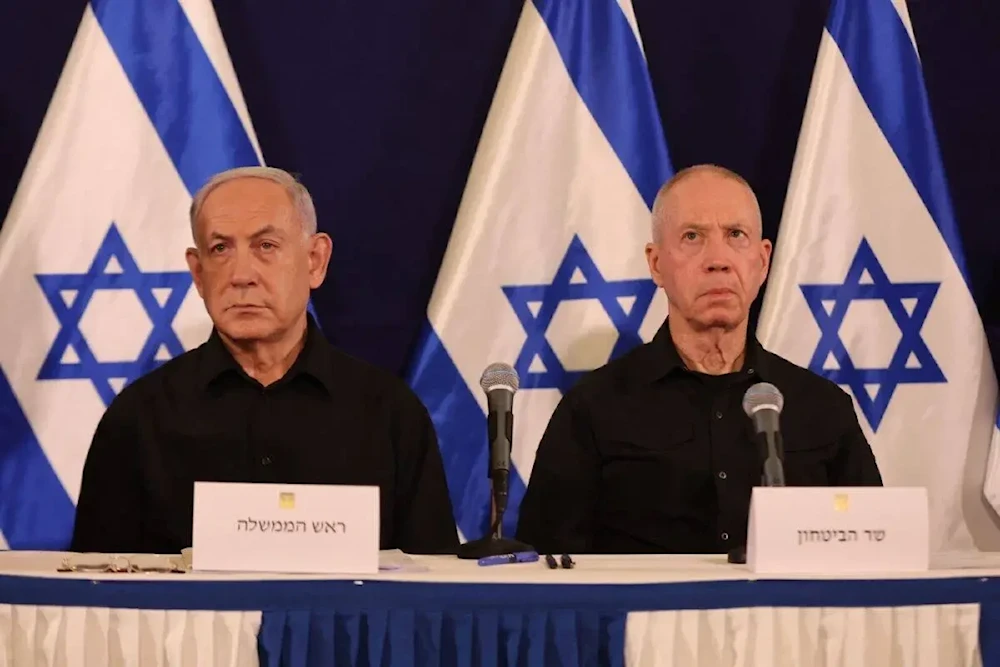'Israel' on its way, head-on, to a political crisis amid war on Gaza
Netanyahu's government is facing its most challenging test so far after the Supreme Court overruled his judicial reform bill amid the brutal war on Gaza.
-

Israeli Prime Minister Benjamin Netanyahu (L) and Security Minister Yoav Gallant attend a press conference in the "Kirya" military base in "Tel Aviv," occupied Palestine, on October 28, 2023 (AFP)
The Israeli political scene might be heading to yet another turmoil, more critical than what the occupation entity witnessed in the months prior to October 7, following a court ruling that nullified one of Israeli Prime Minister Benjamin Netanyahu's judicial reforms flagship bills.
Last year, Netanyahu's government passed a bill to amend the "reasonableness law", which provides the top court with the authority to review and potentially overturn government decisions.
The introduced changes limited the judiciary's power over the Knesset, leading to the Prime Minister's opposition describing his steps as a "judicial overhaul" and accusing him of paving the way for authoritarian rule.
The clause's top advocates were Netanyahu's far-right cabinet partners, most notably Police Minister Itamar Ben-Gvir and Finance Minister Bezalel Smotrich, who conditioned joining his government on proceeding with the judicial reforms, including the change in the "reasonableness" law.
However, the Israeli Supreme Court overturned on Monday last year's legislation to limit the judiciary, thus nullifying an element of one of "Israel's" quasi-constitutional Basic Laws for the first time.
Netanyahu's Likud party condemned the decision, saying it contradicted "the will of the people for unity, especially during wartime."
Two disastrous options
Today's event has put the occupation entity, mainly Netanyahu, at a crossroads, both of which might prove disastrous.
If Ben-Gvir and Smotrich, who are already at odds with the Prime Minister now over policies related to the war on Gaza, decide to pull out of the war cabinet, the government would collapse, and the occupation entity would find itself in a constitutional and political crisis amid the most existential war since its establishment.
On the other hand, a severe reaction from Netanyahu and his extremist allies might push top opposition figure Benny Gantz, who is currently the only member of the opposition participating in the emergency government formed after the Al-Aqsa Flood operation, to exit the Cabinet, as reported by Axios.
Read more: Demonstrations against judicial reform continue for 39th week
This, in turn, would shift the government toward the radical right, something that would result in clear disputes with the United States; "Israel's" top supporter in its war on Gaza.
Furthermore, thousands of Israeli reservists, most significantly from the Air Force, Intelligence, and special unit forces, stopped showing up for service last year after Netanyahu's bill was passed. A repeated political clash might impact soldiers and officers currently taking part in the aggression on Gaza.
Gantz or Katz
Both scenarios are likely to reignite the political and social divisions and strife, yet with the added factor that "Israel" is at war, which would have far more serious repercussions than any previous internal disputes the entity has come against.
This comes at a time when internal disputes within the Israeli War Cabinet are already brewing due to the Prime Minister's refusal to discuss the "day after" the war.
Kan Channel political commentator Mihal Shemesh said, "There is a lot of fear and tension within the war cabinet before a decisive week," pointing out that one of the points of contention is the issue of the day after.
"Netanyahu must choose between [opposition leader and War Cabinet member] Benny Gantz or [Newly assigned Finance Minister and War Cabinet member] Yisrael Katz, and this decision must be made soon," Shemesh said.

 4 Min Read
4 Min Read








